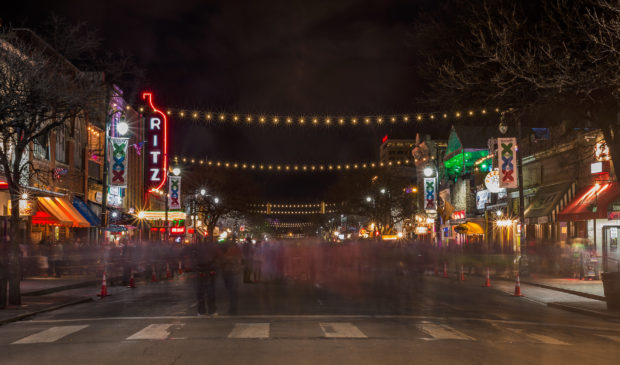Council to examine aid for ‘SXSW resilience’ after festival’s cancellation
Thursday, March 12, 2020 by
Chad Swiatecki City Council and staffers will spend much of next week looking at how to provide assistance to small businesses and workers who stand to be severely impacted by last week’s decision to cancel the South by Southwest festival.
In a post on Council’s web forum titled “SXSW Resilience Plan,” Council Member Jimmy Flannigan laid out some of the goals of the item that will be on the March 26 agenda.
The item appears to be involved with SXSW in name only, specifying “small and local businesses, and service, music, film and others who are impacted by this unfortunate situation” as the primary targets for assistance.
The festival was canceled last week after regional public health officials opted to declare an emergency amid fears of the spread of COVID-19 via festival attendees visiting from all over the globe. The cancellation of the festival, which has an annual economic impact estimated at nearly $360 million, is expected to have severe repercussions for the local economy beginning with bars, nightclubs and restaurants that in some cases earn more than a quarter of their yearly revenue during the 10-day event.
Flannigan told the Austin Monitor it will take a mix of existing city programs and funding sources – and likely some that will need to be created – to provide the assistance he and other Council members agree is needed.
“Next week is when we’ll do lots of brainstorming to identify the programs that we have that can be put to use now, and then others that are more for down the road,” he said. “We’re not talking about South By as a recipient. We’re talking about small businesses, artists, musicians and workers who in some cases make their years on that two weeks.”
In interviews following the cancellation, SXSW executives disclosed the company was not insured for cancellation due to an infectious disease outbreak, and that the cash flow impact from not having this year’s event could lead to insolvency.
More than 50 SXSW employees were laid off Monday in a move to cut the company’s losses.
Flannigan said it will take private sector intervention from lenders or investors to generate direct aid to SXSW, though he said City Council members and other local leaders can and should help facilitate those kinds of deals.
He added that the city would be limited legally in trying to provide direct assistance to the SXSW employees who lost their jobs, but he said officials with Visit Austin are considering expanding an upcoming job fair to all companies so that workers affected by cancellation have a chance to meet with potential employers.
At Tuesday’s Council work session, members were in agreement that it is appropriate for the city to step in and offer more aid than what is likely to be raised by local private fundraising drives.
“SXSW is a powerful economic engine because of how much outside money is brought to our community. More than $300 million of economic activity isn’t going to be solved by moving money around between Austinites,” Flannigan wrote to the Monitor. “While this community has and will do their best to support our local venues, restaurants and other businesses, it will take a larger effort.”
Flannigan said one possible source of city money that could be used in the relief effort is the $3.5 million dedicated to the commercial music industry that was approved by Council last year using Hotel Occupancy Tax funds. A recently formed working group had begun meeting prior to the festival cancellation to look at options for how the money could best be used.
A representative from the Austin Chamber of Commerce said the organization supports Council’s likely intervention to limit the economic damage from the cancellation.
“It’s no doubt SXSW’s cancellation will be a huge economic loss for Austinites in our hospitality and entertainment industries,” said Jeremy Martin, the chamber’s senior vice president of advocacy. “While there’s no immediate solution, the time is right for government, business and community leaders to work together to support our local businesses in both the short and long term.”
Photo by Geoff Livingston made available through a Creative Commons license.
The Austin Monitor’s work is made possible by donations from the community. Though our reporting covers donors from time to time, we are careful to keep business and editorial efforts separate while maintaining transparency. A complete list of donors is available here, and our code of ethics is explained here.
You're a community leader
And we’re honored you look to us for serious, in-depth news. You know a strong community needs local and dedicated watchdog reporting. We’re here for you and that won’t change. Now will you take the powerful next step and support our nonprofit news organization?








